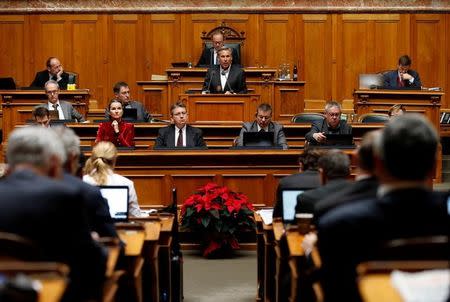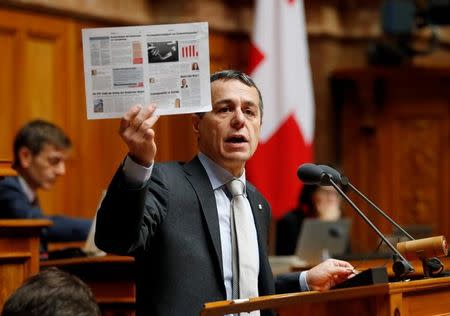Brussels upbeat as Swiss skirt clash with EU on immigration
By Michael Shields and Philip Blenkinsop ZURICH/BRUSSELS (Reuters) - The Swiss parliament passed a law on Friday aimed at curbing immigration by giving local people first crack at open jobs, skirting voters' demand for outright quotas, which it feared could disrupt close ties with the European Union. The European Commission offered a cautious welcome while it checks with members on how to handle non-member Switzerland, knowing that its treatment will be scrutinised for hints on what Britain might expect as it negotiates its EU divorce. A Commission spokesman said the Swiss law "appears to go in the right direction" by not setting quotas of EU citizens able to work there. Commission President Jean-Claude Juncker was due to talk with Swiss President Johann Schneider-Ammann later on Friday, and a joint committee meeting planned for Dec. 22. Brussels has so far shown scant inclination to compromise on free movement of people - the principle underpinning Swiss access to the EU's single market of 500 million - so as not to encourage Britain after its Brexit vote. The bill's lack of upper limits on immigration to a country where a quarter of residents are foreign prompted the right-wing Swiss People's Party to say politicians had defied the people's will as expressed in a 2014 referendum. The SVP, the largest party in parliament, has accused other parties of caving in to Brussels and selling out sovereignty. Its members held up signs in the chamber reading "Breach of the constitution" and "Mass immigration continues". AVOIDING A ROW But a clear majority in parliament did not want a row with the EU, Switzerland's main trading partner, which could retaliate by abrogating bilateral accords governing trade worth about 7 percent of Swiss economic output. The Swiss debate mirrors that in Britain, where voters decided to quit the EU in part to control immigration, which critics said was straining social infrastructure. Asked if the Swiss approach might be a guide for Britain, a spokesman for Prime Minister Theresa May said: "We have made it clear ... that part of leaving the EU is to regain control of our borders. What shape that takes will be decided in the future ... "The other issue is (single market) access ... We will negotiate a deal that allows us the best access ... to trade and operate within the single market." Rather than the quotas voters had demanded, the Swiss law says that, at times of economic upheaval, employers in sectors or regions with above-average jobless rates must inform local job centres of vacancies and get the names of job seekers. The presumption is that local residents will be more likely to register with the centres - although, to the annoyance of the SVP, cross-border commuters and any citizens from EU or EFTA countries will be allowed to do so, enabling the government to argue that it meets the EU's non-discrimination test. The right-wing isolationist group AUNS said it would try to force a referendum on abrogating the free movement accord with the EU because Switzerland was becoming "a colony of the EU". OPEN BORDER Nearly 1.4 million EU citizens live in Switzerland and more than 300,000 commute in from neighbouring countries. Bern believes it can win over Germany, France and Italy to its plan because many of their voters - especially in border regions where populist parties are strong - benefit from high-earning Swiss jobs. Passage of the law cleared the way for Bern to extend free movement on Friday to the latest EU member, Croatia. That, in turn, will restore Swiss access to the EU's Horizon 2020 programme, which funds research projects. In any event, some form of second referendum on Switzerland's ties with the EU looks certain. Many analysts think voters will opt to uphold the accords that smooth business ties. But the wave of migrants that arrived in Europe last year, and a sense that the EU is divided and ineffective, could make it a close call. "You have seen what became of (German Chancellor Angela) Merkel's good idea (to welcome refugees from Syria). I would say 'yes' to quotas," said Siegfried, a retiree from Winterthur who did not give his family name. Others interviewed at random in Zurich disagreed. Conrad Hottinger, a retired engineer from Herrliberg, said parliament had found an elegant way out of a policy dilemma triggered by "mean" far-right politics. "The people have said many times that the bilateral accords have priority. This (the 2014 referendum) was a political chess move by the populist right," he said. (Additional reporting by Ruben Sprich in Bern and by David Milliken and Liz O'Leary in London; Editing by Kevin Liffey)





